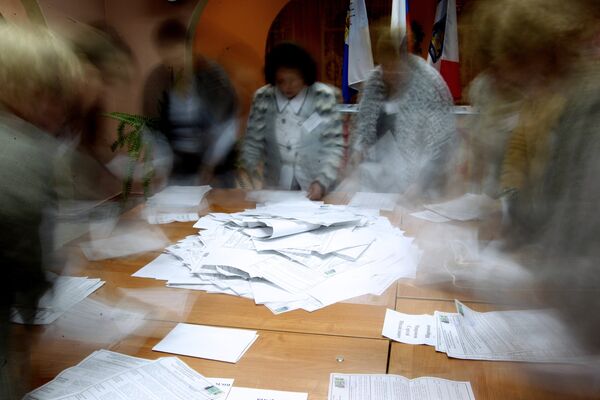A delegation of monitors from the Parliamentary Assembly of the Council of Europe (PACE) shed light on Friday on what is likely to become the main points of their final report on Russia’s presidential elections to be presented in Strasbourg later in April.
In a statement read out by the mission’s head, Dutch Senator Tiny Kox, during a news conference in Moscow, the monitors said the March 4 presidential elections “had a clear winner” and were more transparent then previous polls, yet they “lacked broad citizens’ trust” and were marred by abuse of administrative resources in favor of candidate Vladimir Putin.
Putin, currently Russia's prime minister, won the presidential race with almost 64 percent of the vote, leaving four other candidates far behind. His closest rival, Communist leader Gennady Zyuganov, gathered just over 17 percent, while the rest were even less successful.
Putin took the prime minister’s office after serving two terms as Russia’s president in 2000-2008, as the constitution barred him from running for a third consecutive presidential term. He is due to return to the Kremlin for a six-year tenure on May 7.
A total of 270 monitors from PACE and the Organization for Security and Cooperation in Europe (OSCE) worked in Russia ahead of and during the presidential elections. The PACE delegation revisited Russia with a three-day post-electoral mission on April 11-13. The monitors are planning to present their findings to the Parliamentary Assembly on April 23.
“According to some opinion polls, almost half of the voters did not consider these elections fair although a majority is now more or less satisfied with the results as such,” the statement said.
A survey conducted by the state-run All-Russian Public Opinion Research Center (VTsIOM) a few days after the elections shows 44 percent of Russians believe the election results were reliable and in line with the will of the voters, while 34 percent think fraud may have occurred but it was not extensive enough to affect Putin's victory. Fourteen percent of those polled said they believed the results were wholly untrustworthy, while another eight percent were undecided. The poll involved 1,600 residents in 46 regions across Russia.
In a statement presented the day after the elections, PACE and OSCE observers pointed to mass procedural violations and a clear bias in favor of Putin, whom they nevertheless declared the “clear winner.” Meanwhile, observers from the Commonwealth of Independent States, a loose alliance of former Soviet republics, described the vote as “transparent” and “fair.” The head of the Russian Central Election Commission, Vladimir Churov, also said the elections were “open and fair” like in no other country.
Kox said on Friday the PACE delegation’s current mission to Russia was prompted by a need for an “extra look” into what is happening after elections in a country “where the authorities, politicians and citizens – all call for political reform and demonstrate that in all kinds of ways, where there is electoral reform on its way.”
Russia’s elections took place amid a surge in civil activity, with tens of thousands of volunteer monitors working at polling stations across the country. Following last December’s parliamentary polls, mass street protests in support of fair elections took place in many Russian cities and towns, triggered by widespread allegations of fraud in favor of Putin’s United Russia party. The protests prompted the authorities to initiate a series of reforms to liberalize the country’s political system.
‘Independent electoral referee’
The PACE observers hailed on Friday what they described as “improved media access, more political debate, broad respect of the freedom of assembly” during the March presidential vote, as well as “more transparency on election day” due to web cameras and transparent ballot boxes installed at polling stations across Russia.
They said, however, that the country still lacked a “truly impartial referee in the electoral process,” which has made it hard to verify reports of “substantial manipulation of votes” during the elections.
Churov, the elections chief, has come under fire from the opposition since the December parliamentary elections over his alleged involvement in vote fraud, but has defied calls for his resignation.
“We keep [saying] that Russia is in urgent need of a really independent electoral referee,” Kox told journalists.
He expressed hope that Russian authorities would give heed to his mission’s recommendations and make the correct conclusions from “critical remarks” to be included in the PACE report.
The observers also said “further legal reforms are much needed” in Russia such as “far reaching modification and simplification of the rules on the candidacy in presidential elections, direct elections of governors, and creation of an independent public broadcast channel.”
Last week, a presidential law simplifying Russia's stringent requirements for the registration of political parties came into force after being approved by wide majorities in both houses of parliament. The new law reduced the membership requirement for registering a party to 500 people from the present 45,000 while abolishing the requirement for parties to collect voter signatures in order to take part in elections.
Earlier this week, outgoing President Dmitry Medvedev called for a law reintroducing direct elections of governors in Russia to be adopted by the end of April. The bill has already passed the first reading in the State Duma, the Russian parliament’s lower house. A bill easing registration requirements for presidential candidates has also been introduced to the State Duma.




